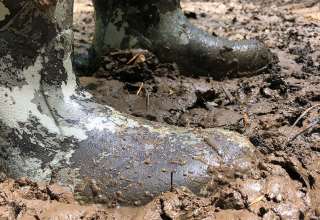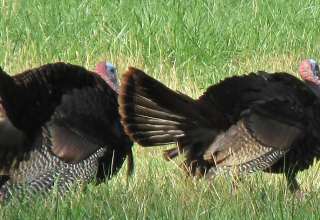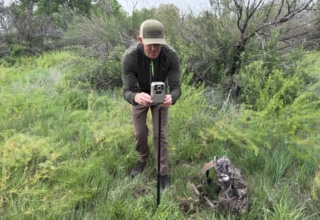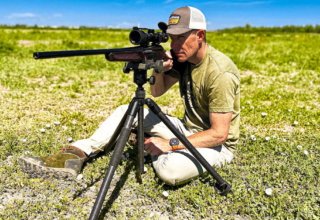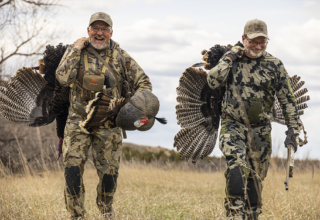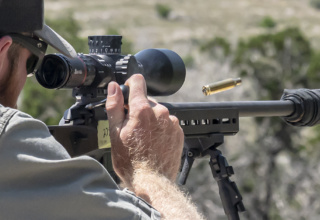Whether you’re on the range or in the tree stand, ZONE offers a chemically safe insect repellent that works
by Pete Rogers; photography by Therese Shaw and Pete Rogers
Summer means a lot of things here in the South, such as hot, humid days punctuated by hot, humid nights. It also means bugs. Lots and lots of bugs — mosquitoes, ticks, gnats, no-see-ums, deer flies, horse flies, yellow flies, and who knows how many other flying beasties that love to bite, burrow, buzz, and bomb you until you can’t take it anymore.
And we don’t just have mosquitoes. Oh, no…we have 61 (you read that right, 61) different kinds of mosquitoes just in my home state of South Carolina. Petitions have circulated to nominate the mosquito as the state bird. While aspiring in many regards, it is an accurate representation of the most prolific creature in our state, along with gnats, no-see-ums, chiggers, and ticks.
Mosquitoes, though, are more than pests and irritants; they are responsible for over one million deaths annually. According to the CDC, the mosquito is the deadliest of all creatures in the world, accounting for more deaths than any other animal on the planet. In the U.S., the West Nile Virus is the most threatening disease that is spread from mosquitoes.
No-see-ums, gnats, chiggers, deer flies, and other biting flies are more of a painful nuisance, and people spend millions every year to keep these pests at bay.
It has long been known that products containing DEET effectively repel these biting insects; however, many people are allergic to DEET, and there are some health risks with using DEET in high concentrations. DEET can causes unpleasant sensations, leaving the skin feeling oily and irritated. It has also been known to be damaging to certain materials, such as clothing and plastic. Even so, many of the most popular repellents contain anywhere from 30- to 100-percent DEET. In some environs, only those repellents with over 70-percent DEET concentration will work effectively.
Recently, I discovered ZONE brand insect repellents. Rather than using DEET as the active ingredient, ZONE repellents use Picaridin — a safe, non-greasy alternative to DEET that has been shown to be equally effective but without the problems associated with DEET.
Being a full-time trapper who chases beaver and other nuisance animals all year long, I am in the woods around 300 days a year. The places mosquitoes, deer flies, and other biting critters call home is where I work every day. If there is a repellent that is supposed to keep biting bugs at bay, I have used it.
Not long ago, while working near a beaver swamp, I was in a hurry and forgot to spray. The next day, there were hundreds of chigger bites on my feet, ankles, and lower legs. If you have never encountered a chigger infestation, you have not lived a full life in the outdoors. The relentless itching is not only torturous, it lasts for days!
Contrary to myth, chiggers don’t live in the host. They bite them, get their tiny droplet of blood, and retreat. The enzymes they inject at the bite location causes the itching. No amount of Calamine lotion, Benadryl, or any other topical ointment can bring relief. Scratching, of course, brings its own problems.
Famed outdoor writer Havilah Babcock, in his classic period work entitled My Health is Better in November, penned an entire chapter on the frustrations and relentless itching caused by chiggers. In this chapter, he wrote the following when questioning a fellow about the trauma he was experiencing:
“What do you do when you get chiggers?” I asked.
“I scratch it,” he answered.
“But what do you do when you get ’em all over you?” I pursued.
“I [get] my wife to help me scratch,” he said.
The best method of dealing with chiggers is to avoid them with the same fervor as one tries to avoid COVID-19. Social distance from where the chiggers call home, and when forced into their domain, wear a mask. In this case, the mask is ZONE insect repellent.
As someone who abhors perfume smells and, being a hunter and trapper, who is always keen about scents and odors, I avoid anything with fragrance. Thankfully, ZONE makes an unscented spray that is as effective as their scented version. Prior to entering the woods where I suspect chiggers and mosquitoes will be found, I spray my boots, socks, the lower portion of my pants or legs, and my hat and shoulders with ZONE insect repellant. Not a single chigger or mosquito has bitten me since I began using it.
For a strategic test, I recently asked my daughter’s boyfriend to wade into the tallest, nastiest chigger grass I could find to see if he would be bit. After applying a reasonable dose of Zone repellent and, wearing sandals, shorts, and a T-shirt, he dove headlong into the waist-high grass. The repellent worked, as he emerged chigger- and bite-free after I allowed him to come out.
When heading into beaver swamps or hunting the early season, I want something that does not harm my clothing, is not a skin irritant, is odor-free, and works at keeping all biting critters away from me. The Picaridin in ZONE repellent delivers on all points. For those of you who will be participating in early archery seasons, where the temperatures will still be uncomfortably warm and the biting insects as hungry as ever, I suggest you give this product a pre-season trial of your own.
Interestingly, ZONE did not begin as an insect repellent. It started as an animal repellent. If you have owned dogs, you know how they love to dig, especially in soft soil around flowers and vegetable gardens. ZONE animal repellent is designed to keep dogs away from unwanted areas. Likewise, their snake repellent and deer repellent also are designed to keep those species away from designated areas.
As a vegetable gardener, I am constantly battling “garden raiders” — usually in the form of rabbits. A light spray of the ZONE animal repellent “Oh Deer!” around the garden has been keeping the cottontails out and allowing my vegetables to thrive.
If you are in the need for an insect or animal repellent that is DEET-free and works well, you need to give ZONE repellents a try.







